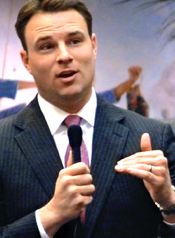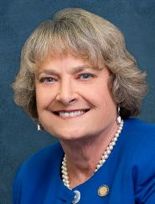 Florida supporters of a text-messaging law head into the new legislative session with hopes for change in the capital city of Tallahassee, but early signals are mixed.
Florida supporters of a text-messaging law head into the new legislative session with hopes for change in the capital city of Tallahassee, but early signals are mixed.
A four-time sponsor of texting legislation says “some of my major stumbling blocks” have left the Legislature.
But the incoming speaker of the House, Will Weatherford (left), issued a statement this week that appears to support the “individual rights” of drivers to text message.
The Republican leader’s comments came as the first Florida Distracted Driving Summit brought to Tampa more than 270 government officials, safety advocates and law enforcement officers.
U.S. Transportation chief Ray LaHood, the Nov. 13 event’s keynote speaker, said it was “critical” that resistance to distracted driving laws be changed in the Sunshine State.
Gov. Rick Scott recently called for traffic safety officials to study texting & driving in Florida to determine if it was a legitimate public safety issue.
LaHood responded: “The troopers of the (Florida Highway Patrol) and the pediatric surgeons at Shriners Hospitals have seen the evidence firsthand.”
The Orlando Sentinel editorialized that Scott’s call for more data “is like studying whether smoking causes cancer.”
Florida is one of 11 states without a ban on text messaging by all drivers. In fact, it has no distracted driving laws.
The major resistance to distracted driving laws comes from the House, while the Senate recently approved a texting ban.
State Rep. Irv Slosberg, who has filed several unsuccessful pieces of distracted driving legislation, blames their failure on “powerful libertarians” among Florida’s lawmakers. Slosberg, D-Boca Raton, had hoped the next House speaker would be more open to a texting & driving ban, but that doesn’t appear to be the case.
Weatherford, a 32-year-old Republican from the Tampa Bay area, said:
“Elected officials have a responsibility to … ensure drivers are safe on the roadways. Equally as important as our safety are our individual rights, and in the case of texting while driving, there should be no exception.”
A reporter from the Ocala Star-Banner sought clarification of Weatherford’s reference to individual rights, without success. Weatherford did signal he would be open to discussing specific plans.
The previous House speaker opposed “one more layer of prohibitive behavior” from state government.
 State Sen. Nancy Detert (left) plans to refile her plan for a ban on texting & driving. Her previous bills failed three times. Detert’s 2010 texting bill cleared the Senate, but failed to get a hearing in the House due to a panel chairwoman who found distracted driving legislation “intellectually dishonest.”
State Sen. Nancy Detert (left) plans to refile her plan for a ban on texting & driving. Her previous bills failed three times. Detert’s 2010 texting bill cleared the Senate, but failed to get a hearing in the House due to a panel chairwoman who found distracted driving legislation “intellectually dishonest.”
“Some of my main stumbling blocks are no longer in the Legislature,” Detert told WFTV.
Detert’s bill seeks only secondary enforcement. It also allows for texting at red lights. That makes her plan about as tame as distracted driving legislation gets.
Detert, R-Venice, said early this year: “I’d like to get this done before there’s a tragedy where someone takes out all the kids at a bus stop and then the public is screaming, ‘Why didn’t you do something about it.’ ”
In 2011, Gov. Scott, also a Republican, vetoed a bill that would have required the DMV to provide education on the dangers of electronic distracted driving.
The governor’s Oct. 23 call for a texting study came after a Department of Highway Safety report that Florida traffic fatalities are up 4 percent so far in 2012. The state does not track texting or cell phone use in accident reports.
The Florida Distracted Driving Summit heard from families who lost loved ones to distracted drivers.
“We must have a ban on texting while driving,” said Russell Hurd, whose daughter was killed by a texting driver near Orlando. “We have the power” to force legislators to ban the practice, he said.
A stretch of U.S. 41 is named in honor of Heather Hurd, the Heather in Heather’s Law.
The Florida Distracted Driving Summit was the first organized in part by the new Distraction Advocate Network, established by Jennifer Smith, who previously headed the victims and survivors group FocusDriven. Other hosts were USAA insurance, the Florida Department of Transportation and Shriners Hospitals for Children.


It is well established that anti-texting laws do not stop motorists from texting. It only causes them to lower the device into their laps so that the police can’t see them texting. In short, anti-texting laws actually cause drivers to crash. The proof can be seen in NY where crashes for the first half of the year are way up.
Why can’t lawmakers do some research before passing bad laws? Could it be that they need the revenue that crashes generate?